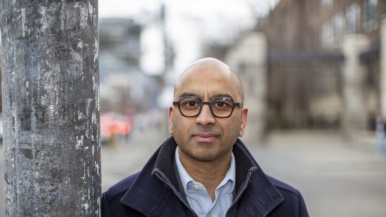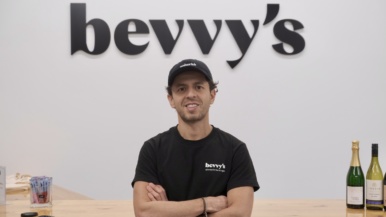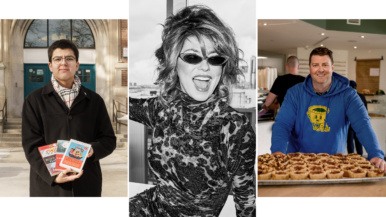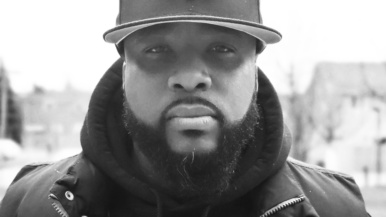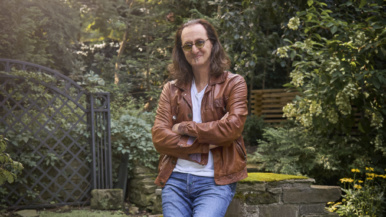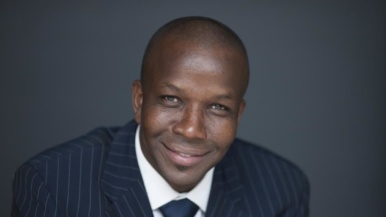Q&A: Doug Ford, whose new book aims to set the record straight on his brother’s disastrous mayoralty
Tory’s weak, Wynne’s a mess and Trudeau’s a train wreck. Doug Ford’s bombast hasn’t faded since he left city hall—and he wouldn’t mind an opportunity to show them all how it’s done

It’s a pretty classic one-two sequence: autobiography followed by campaign for public office. Ford Nation: Two Brothers, One Vision comes out today. Can we expect Doug Ford lawn signs soon?
Maybe somewhere. My phone has been ringing with people urging me to go federal, but that’s a massive undertaking. Provincially, Queen’s Park is a real financial disaster right now, and lifelong Liberals tell me they aren’t going to vote for Kathleen Wynne. And then there’s the mayoral race. I feel like I have unfinished business there.
You came close last time. Mayor Tory beat you by 64,000 votes.
I hate losing. I don’t care if it’s checkers, Monopoly, whatever. I hate it. I’d like to take another run at Tory. I figure it came down to three and a half percentage points. Three and a half more for me, three and a half fewer for him, and I’d be mayor right now.
You seemed to hate the city hall circus while you were there, but clearly you haven’t said goodbye to politics.
I’m involved in politics every day. Every day my phone is ringing. I get endless constituent calls. Yesterday was an immigration issue, a tax issue, a roof tax issue, and a case of someone’s water running from one property to another.
And meanwhile, you’re at Deco Labels trying to run a business. Given the demands on your time, why did you feel compelled to sit down and write a book?
I sat down with Rob and we talked about a book just after he discovered he had cancer. And over the following year, we saw all these books about our family come out. Ninety per cent of them—well, I never read them, but my mother did—were all lies.
Are you referring to Robyn Doolittle’s book?
Yeah, and Mark Towhey’s book and John Filion’s. I said, “Mom, just take a highlighter and mark all the false accusations.” Every second page, she had those books lit up like a Christmas tree. She was getting so angry. She said, “These are just lies.” Everyone asks me why I don’t just sue them. If I did that, I’d spend a million of dollars in legal fees.
So you figured, instead of lawsuits, write a book and set the record straight.
Exactly. And the book is really one-one-millionth of what really took place.
What is its central message?
Half of the book is about our family, and the other half is the political journey, including what took place down at city hall. The message is, “Even though you may disagree with our politics, sit down with us.” I haven’t met one person who after sitting down with Rob didn’t like him. We’re just average people. There’s nothing special at all about our family. We aren’t staunch, radical Conservatives. Rob was two steps left of Jack Layton. I used to tell him that all the time.
In a promotional appearance about the book in September, you said that no one in the media is safe, but outside of a few zingers describing the media as “vultures,” it’s pretty tame. Did the publisher’s lawyers pare down the attacks, or were you just in hype mode?
Well, I was in hype mode. I really wanted to name names, but I sat down with our family and told them what I wanted to do. My mother said, “Don’t go down that road. Don’t go low.” And the lawyers had their comments, too.
So did you write a more acidic version?
I did.
And do you keep it nearby for cathartic purposes?
Haha. That draft is around, yes. They were true, honest attacks. But as with anything, you’ve got to have backup, and figure out how many people are willing to go in front of a court. I didn’t want to drag other people into this.
You write that when your brother was fired from his volunteer duties as a football coach at Don Bosco, the impact was bigger than most people knew.
Was it ever. Rob loved those kids. I remember he used to drive one of his players home, and the kid would say, “Oh coach, come on in.” And Rob would walk in, and there’s two or three little ones sitting there, and Rob would realize that the kid was looking after his siblings while the mother was out working two jobs. There is no father. Rob looks in the cupboard and sees that there was no food, so he goes buys a whole bunch of groceries. I remember another time, I walked into the mayor’s office and there was this massive kid from the team, maybe 300 pounds, 6’ 5”, and he was sobbing. Rob was holding him in his arms. I guess the kid had had a problem with the police, and he kept saying, “Don’t tell my mother.”
You write that the Don Bosco event may have exacerbated your brother’s problems with substance abuse.
It’s hard to say for sure, but I think that was a breaking point, and everything kind of went from there.
When it came to his addictions, Rob instituted a “Don’t Tell Doug” policy with his staff, buddies and childhood friends. How did you interpret that policy when you found out?
I guess he had a certain amount of respect for me and didn’t want to hurt me. And as crazy as it sounds, I would still trust Rob after a bottle of scotch more than I would the other councillors at city hall. But yeah, Rob could hide it well. When he and I left city hall at the end of the day, he did his thing and I did mine. If we had events, we’d go together sometimes, sometimes not. When he came to family functions he wouldn’t drink. I’m not super naïve. I knew he would have a few drinks, but I didn’t know the extent of the problem.
At what point did you discover how bad it was?
When I was driving him to the rehab centre. It was midnight, and he was talking to his doctor on the phone, who asked him, “What did you do, how much did you drink?”
Rob told the doctor that the drinking was an everyday problem.
Yeah, I believe it. It was either no drinks or one hundred.
How bad was his drug addiction?
I have no proof, but I don’t think he was an everyday user. He’d drink, get hammered, and go to some stupid place and do this crap. I’m Rob’s executor and I saw his bank statements. They’re healthy. You can’t have a healthy financial statement if you’re a drug addict.
Meaning what—there are no unexplained withdrawals, hundreds or thousands of dollars in cash with no clear purpose?
Yeah. It just didn’t happen.
In the book you cry foul against the media. Ultimately, though, the central blockbuster—that your brother had a drug and alcohol problem—was true. Weren’t the reporters just doing their jobs?
That part was true, but my complaints start well before that. The Toronto Star accused him of hitting a football player he never touched. And Star reporter Daniel Dale thought he was smarter than me and budget chief Mike Del Grande. These are the types of reporters who have never seen a profit and loss statement in their lives, and they are telling me—a guy who lives, breathes and eats these line-item by line-item budgets—that he knew how much we were saving better than we did.
I do recall a lot of disagreement whether it was a billion dollars saved or rather—
It was over a billion. And that’s when I joked: when your worst enemy in the world tells you you’ve saved just $680 million and not a billion, hey, I’ll take it.
What other coverage did you take exception to?
Well, Robyn Doolittle followed my 80-year-old mother around. My mother goes apple picking every fall and distributes apples to the neighbours. She went to family friends of ours—a retired judge—and said, “Here’s some apples for you and Mary” and then left. The judge gets a knock on the door: “I’m Robyn Doolittle. Was Mrs. Ford here?” The judge looked at her and said, “It’s none of your damn business.” She followed us to Florida and bothered our building superintendent. He finally said he was going to call the police on her. Reporters would follow me to the Deco Labels plant in New Jersey, the plant in Chicago. They went up to my cottage. My kids didn’t even want to go outside because we had the Toronto Star on one side and that crazy magazine, what is it…Now Magazine, in a boat on the lake.
Isn’t there some reasonable expectation that the mayor be available to the media? Your brother completely shut out a major daily because he didn’t like their coverage.
He had to, because they’re a bunch of liars.
In the book, the media is part of a sprawling group you call “the establishment.” Who else do you put in that category?
The politicians, Bay Street, Bill Blair when he was chief. The elites. The people that control politicians of all parties. I’ll never forget one time when I sat across from a very well known and wealthy person at a dinner. He said, “Doug, do you know how easy it is to buy politicians? You give them a $2,000 donation and you’ve got them.”
So the establishment just couldn’t stomach a blue-collar suburbanite as mayor. Is that how you see it?
One hundred per cent.
You toss around a staggering amount of blame in the book. And I don’t mean to be indelicate, but, look, your brother did crack cocaine while he was in office. Do you really see him as blameless?
It was inexcusable. At the end of the day, his demise was on him, one hundred per cent. You open the door and you let the lunatics into your house. But people will excuse things like that. Everyone knows someone who has an addiction issue. If you get help, which Rob did, most people, though not all, forgive you. Where people don’t forgive you is when you take money and when corruption is involved.
You call Mayor Tory honest and fair but also weak and eager to please. You say he’s essentially an instrument of the establishment.
One hundred per cent.
How would you rate his mayoralty so far?
I’d give him an F. What has he done outside of raise taxes? He’s looking at a roof tax, taxes on parking spots. He’s back into the same old tax, tax, tax. Look, when everyone’s getting along at city hall, that’s a problem.
If you were swept in to the mayor’s chair tomorrow and given executive power, what are the first three things you’d do?
I’d abolish any talk about the streetcars. I would cut back on all the councillor’s expenses, and I would review all levels of supervisors and managers and try to cut back the bureaucracy.
You are fired up right now. I can see it in your face.
I absolutely love it! There’s a right way and there’s a wrong way. In our company we can get a crappy little machine and pay half the cost, or a proper machine that’s going to last a lot longer.
In the book, you refer to the other councillors as “obstacles.” Do you think that characterization explains at least in part why you and your brother encountered so much pushback?
Well, in the first two years, we got more done than Tory and Miller combined. Miller was seven years, Tory has been two. Again, there’s proof on paper, what our accomplishments were in the first two years. With any government you get as much as you can, year one, year two. Year three, ironically, we got our biggest accomplishment done, the Scarborough subway. We had the funding from the feds, the province, everyone signed on to it, including council.
You seemed to take the city hall antics more personally than your brother.
At times it got personal. But I was coming from the private sector. Those other councillors are seasoned veterans. Skin like alligators. They would call Rob every dirty name under the sun, and it would just roll right off him. He would always tell me, “You’ve got to calm down.”
Is your skin thicker now?
Yeah. It grows layers down there.
Your nephew, Michael, is now a city councillor. Why him and not you?
I’ve got to look at other areas that I think I would be more helpful. Keep in mind that Toronto is just a creature of the province, and if you really want to get things done, you go provincial or federal.
How do you think Justin Trudeau is faring so far?
Absolutely terrible. How he even got elected is mindboggling. Jean Chrétien, Paul Martin: bright guys. Justin Trudeau? I’m shocked. It just goes to show you, pizzazz trumps experience. The deficit has increased by $25 billion already. In three years, it will probably be 70 billion, and they have no way of paying it down.
Rob Ford, Donald Trump: let’s compare and contrast.
Night and day. Rob was out there working for the people for 14 years. Rob’s base was the ethnic community.
Hmm…I believe “ethnic” is passé.
I know it is, because we’re the minorities now because over 50 per cent of Torontonians weren’t born here. But I would say that the movement was similar—you saw what happened with the Brexit vote in the U.K., you saw the vote in Iceland and Poland, even the Philippines. People were just fed up. You saw it on the left, with the Democrats and Bernie Sanders. People are ticked off on both sides.
With what exactly?
Just the typical B.S. from politicians. It doesn’t matter what party they’re from. The establishment, the Washington elites. It’s the same old backroom deals.
Brexit’s Leave camp and Trump share aggressive anti-immigration policies. Does that trend worry you?
I’m pro-immigration. That’s our base. These are people that call us up that have come from corrupt countries. They went through hell and back, and they come here and they have a problem and they can’t believe that they can pick up the phone and call the mayor at home and he shows up to their door. That’s just unheard of.
Who would you have voted for if you were American?
Trump. Not a doubt in my mind.
Even though he called Mexicans rapists and boasted about grabbing women—
It’s unacceptable. I live with five women. But it’s interesting: I sat down with my wife and four daughters and asked them what they thought of that quote. They said it was disgusting. I said, “OK, who would you vote for?” They all said Trump.
How do you explain it?
Jobs and the economy trump everything else, every time.
Kellie Leitch, a contender for the Conservative leadership, is tapping into the same xenophobia. What do you make of her platform?
Kellie’s not that way, at least the Kellie I know, and I’ve known her for years. She’s just trying to differentiate herself from the rest of the pack. That one part of her platform is weak. When she says, “We’re going to see if they share our Canadian values,” well, your Canadian values are different from mine, different from 20 people in the back of the plant here at Deco.
How would you differentiate yourself from the pack if you were to run for the Conservative leadership?
I’d switch the party from the party for rich old white folks to the working-class party.
You’d try to eat the NDP’s lunch. Which is essentially what Trump did with the blue-collar voters who used to flock to the Democrats.
Exactly. It’s what our dad preached—we used to call him the Dipper, because he was essentially an NDPer in Conservative Party clothing. And it was the same with Rob throughout his career.
After being in the public eye so intensively and for so long, your brother was suddenly, in the latter half of 2015, removed from public view as he dealt with aggressive pleomorphic liposarcoma. What was it like to be at his side during those moments?
Extremely tough. And to keep a strong face in front of him, that was very tough. I held it in, ironically, until John Tory showed up. That was around the time they told us Rob has five or 10 days to live. Tory said, “Rob, a lot of stuff we’re doing is because of what you started.” Rob said “God bless you, John.” I thought everybody was going to break down. We left the room and I just lost it, with John there in the hallway. That was the first time that I broke down because I knew that the end was coming. There’s a human aspect to politics. I have a great deal of respect for Kathleen Wynne for coming to the funeral. She didn’t have to do that. People said, “Oh, she was forced.” No, she wasn’t forced to do that. She separated the politics and the human aspect. The same with John Tory. We had our differences, but I respect that he came to see Rob.
We learn in the book that Rob’s kids, Stephanie and Dougie, have spoken about running for office down the road. They’re obviously too young to know what that really means, but do you think it’s likely?
Possibly. They joke around. Little Dougie thinks he’s the mayor. He took control of the cameras at the funeral and said “Ok, that’s enough, see you later.” They actually listened to him better than they listened to Rob and I. And I can’t say enough about Stephanie’s eulogy. She’s a super bright young girl. She wrote all her thoughts down and she says, “Can I say my dad is going to be mayor of heaven?” I said, “If you want to say it, say it.”
How are the kids doing?
It’s tough. They miss their dad greatly. Little things like Halloween—Rob would always take them out. Christmas is coming up. Stephanie said the other day, “I love going to Nanny’s when the family is around.” They need that love, the hugs and attention. Rob was very affectionate with his kids. He just loved them.
Do you see them often?
Yep, I try to go over there every day or every other day. My wife will go over, my mother will go over. I coached them soccer, so I would bring them to soccer all the time, and went to their banquets. Renata is all right. She’s finding it tough, too. There’s a big hole there.
The book ends with Rob’s last breath. How difficult was it to write those words?
I couldn’t even focus. I was full of tears when I was writing that last part, because I was re-living it. It was a terrible, terrible death. He couldn’t breathe; he kept choking. I was literally putting stuff down his throat trying to drain all the fluids out. I saw my dad die that same way. Rob and I always said, “No matter what, if one of us goes, make sure I can breathe and die peacefully.” And he couldn’t breathe, because the fluids were just building up. It was a terrible death. I wouldn’t wish it on my worst enemy.
Can you tell us about your last moments with your brother?
It was unbelievable. He was in a near-coma. He didn’t open his eyes for seven or eight days straight. And then, a few days before he died, his kids came in, and he opened his eyes and kept saying, “Oh wow,” trying to summon energy for them. Then he would close his eyes. The doctors kept saying, “He can hear you.” On the last day, it was harder for him to breathe. His breathing was slowing, and I could see the heart monitor, and then it just kind of stopped. I was about an inch away from his face. He opened his eyes—it kind of freaked me out—they were wide open, it was like, “See you later.” Then I just grabbed him and wouldn’t let go. And then he was gone.
